Intelligent Customer Experience and the Road to Better Customer Journeys
Rather listen to the BlogCast for this post instead? Then, click the “Play” button below to hear it now.
Introduction
Intelligent Customer Experience (ICX) is the future of customer service, utilizing state-of-the-art technologies such as artificial intelligence (AI), machine learning, and natural language processing. This results in personalized, efficient, and effective support that caters to the unique needs of every customer. ICX has the potential to revolutionize the way businesses interact with their customers by improving customer satisfaction and loyalty while reducing costs and increasing efficiency.
However, there are certain challenges and limitations to consider when it comes to intelligent customer experience. Therefore, in this article, we will explore the benefits and potential problems of ICX, as well as the importance of maintaining a human touch in customer service. We will also discuss how intelligent customer experience and human customer service can coexist and complement each other to create better customer journeys overall.
Benefits of Intelligent Customer Experience
ICX has the potential to improve the customer experience significantly by providing personalized, efficient, and effective support. Here are some of the primary benefits of intelligent customer experience:
Personalization
ICX leverages customer data and AI to deliver tailor-made recommendations, assistance, and content for each customer. This can help businesses better understand and meet the specific needs of their customers, resulting in a higher level of satisfaction and loyalty.

Efficiency
With its fast and precise processing, ICX empowers businesses to swiftly address a significant number of customer inquiries and requests, resulting in enhanced customer service and increased efficiency. This can aid in providing significant cost savings and a boost in overall efficiency.
Effectiveness
Intelligent customer experience ensures that customers receive precise and meaningful information, empowering them to resolve issues and discover solutions to their queries. This has the potential to enhance the customer experience as a whole and decrease frustration.
Availability
ICX operates non-stop, offering assistance to customers 24 hours a day. This can be especially helpful for businesses catering to a global customer base or those that have extended operating hours.
Consistency
With intelligent customer experience, businesses can ensure that customers receive reliable and precise support, no matter where they are or what language they speak. This can contribute to enhancing the customer experience and establishing a solid foundation of trust with customers.
Potential Problems with Intelligent Customer Experiences
While ICX has many potential benefits, it is not without its challenges and limitations. Here are some potential problems with ICX:
Lack of Empathy
Critics often point out that intelligent customer experience falls short in its capacity to display empathy or comprehend the emotional state of customers. This can be a problem when customers are upset or frustrated, as they may not feel understood or heard by the ICX system, leading to increased dissatisfaction.
Limited Capabilities
Although ICX is effective in managing a variety of customer inquiries and requests, it may encounter limitations when faced with complex or unusual issues. In these instances, customers may find it necessary to interact with a human representative for help.
Miscommunication
When using ICX, there is also the possibility of miscommunication or misunderstandings, as it may not understand the context or intention behind a customer’s message.
Lack of Personal Connection
For some customers, speaking with a human representative is important because it creates a sense of personal connection and builds trust. Recreating this feeling of personal connection might prove to be a challenge for AI or ICX.
Importance of Maintaining a Human Touch in Customer Service
Despite the potential benefits of intelligent customer experience and AI, many customers still prefer to speak with a human representative when seeking support or assistance. According to a survey by American Express, 40% of customers prefer to speak with a human for customer service, while Microsoft reports 53% prefer using self-service options like chatbots or virtual assistants.
There are several reasons customers may prefer speaking with a human over using ICX:

Empathy and Understanding
As stated earlier, a major drawback of ICX is its inability to display empathy and understanding. Customers may feel more understood and supported when speaking with a human representative who can show empathy and understanding.
Complex or Unusual Issues
As mentioned earlier, ICX may not be able to handle complex or unusual issues. In these cases, customers may prefer to speak with a human representative who has the knowledge and expertise to help them.
Personal Connection
As noted earlier, there are customers who may favor conversing with a human representative, as they find it establishes a personal connection and builds trust. This can be particularly valuable for businesses that prioritize the cultivation of long-term connections with their customers.

Language Barriers
Intelligent customer experience systems with advanced AI may still struggle to comprehend or communicate in diverse languages or dialects. In these instances, customers may prefer a human representative who can communicate in their language.
How ICX and Human Customer Service Can Coexist and Complement Each Other
While ICX and human customer service may seem like competing options, they can actually coexist and complement each other to create a better customer experience. Here are a few ways in which ICX and human customer service can work together:
Use ICX for Simple, Routine Inquiries
ICX is ideal for handling simple, routine inquiries quickly and accurately, freeing up human representatives to handle more complex or unusual issues.
Using Intelligent Customer Experience as a Triage System
ICX can serve as a triage system, effectively assessing customer needs and directing them to the right human representative. This helps ensure customers receive support that is tailored to their needs and provided in a timely manner.
Leveraging ICX to Gather Customer Data
By leveraging intelligent customer experience, businesses can collect valuable customer data, including frequently asked questions and common issues, enabling them to enhance their offerings and deliver superior customer support.
Utilizing ICX to Provide Consistent Support
ICX’s support is consistent and accurate, ensuring that all customers receive the same level of assistance, regardless of their location or language. Implementing this can enhance the overall customer experience and foster a sense of trust with customers.
Examples of Intelligent Customer Experience
There are many examples of businesses using ICX to improve the customer experience. Here are just a few:
Amazon Alexa
Alexa, Amazon’s virtual assistant, uses advanced technology like natural language processing and machine learning to deliver tailored recommendations and help to its users. Alexa’s capabilities include answering questions, serenading you with music, and effortlessly controlling your smart home devices, among other impressive tasks.
Zendesk’s AI Chatbot
Zendesk, a customer service software company, features an AI chatbot that harnesses machine learning and natural language processing to provide customers with personalized and accurate assistance. The chatbot can manage a large number of inquiries and seamlessly integrate with other customer service tools.
Apple Siri
Apple’s virtual assistant, Siri, is another example of intelligent customer experience and uses natural language processing and machine learning to provide personalized recommendations and support to customers. Siri can answer questions, make phone calls, and send texts, among other things.
Data on Intelligent Customer Experiences
Here are a few relevant data points on ICX:
According to a survey by Gartner, only 17% of companies use AI, ICX, and machine learning to personalize customer experiences, while 63% of companies still struggle with personalization. Furthermore, the number of customers demanding personalization continues to grow every year.
A survey by Zendesk found that 67% of customers prefer to use ICX type systems for self-service customer service, while only about 40% prefer speaking to a live agent for support.
According to Oracle’s survey, 77% of customers claim that their overall experience with a company is improved when the company provides personalized interactions.

Conclusion
By offering personalized, efficient, and effective support, intelligent customer experience has the potential to significantly enhance the overall customer experience. However, there are also potential problems with ICX, including its lack of empathy and limited capabilities. Therefore, businesses must carefully weigh the advantages and drawbacks of ICX while ensuring a personal touch in customer service.
Intelligent customer experience and human customer service can coexist and complement each other, with ICX handling simple, routine inquiries and human representatives dealing with more complex or unusual issues. By combining the strengths of both ICX and human customer service, businesses can create better customer journeys and improve customer satisfaction and loyalty.
Businesses must carefully consider their customer service strategy, finding the perfect balance between intelligent customer experience and personalized human support. By using a combination of both, businesses can provide personalized, efficient, and effective support to their customers, resulting in improved customer satisfaction and loyalty.















